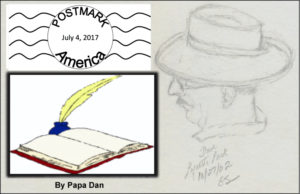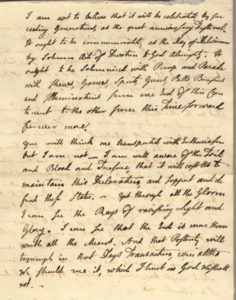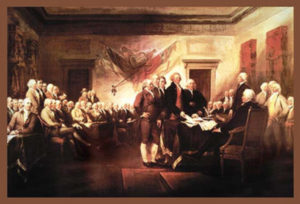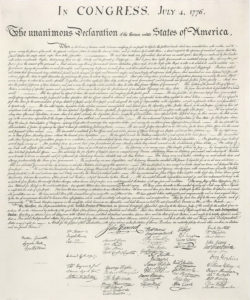America’s Great Anniversary Festival

“It ought to be solemnized with Pomp
and Parade, with Shows, Games, Sports,
Guns, Bells, Bonfires and Illuminations
from one End of this Continent to the other from this Time forward forever more.”
— John Adams, July 3, 1776
Click here to download a PDF of this post: The_Fourth_2017
= = = = = = = = = = = = = = = = = = = = = = = = = = = = = = = = = = = = = = = = = =
From a letter from John Adams to Abigail Adams, July 3, 1776
 “The Second Day of July 1776, will be the most memorable Epocha, in the History of America. … I am apt to believe that it will be celebrated, by succeeding Generations, as the great anniversary Festival. It ought to be commemorated, as the Day of Deliverance by solemn Acts of Devotion to God Almighty. It ought to be solemnized with Pomp and Parade, with Shows, Games, Sports, Guns, Bells, Bonfires and Illuminations from one End of this Continent to the other from this Time forward forever more. …You will think me transported with Enthusiasm but I am not. — I am well aware of the Toil and Blood and Treasure, that it will cost Us to maintain this Declaration, and support and defend these States. Yet through all the Gloom I can see the Rays of ravishing Light and Glory. I can see that the End is more than worth all the Means. And that Posterity will tryumph in that Days Transaction, even altho We should rue it, which I trust in God we shall not.”
“The Second Day of July 1776, will be the most memorable Epocha, in the History of America. … I am apt to believe that it will be celebrated, by succeeding Generations, as the great anniversary Festival. It ought to be commemorated, as the Day of Deliverance by solemn Acts of Devotion to God Almighty. It ought to be solemnized with Pomp and Parade, with Shows, Games, Sports, Guns, Bells, Bonfires and Illuminations from one End of this Continent to the other from this Time forward forever more. …You will think me transported with Enthusiasm but I am not. — I am well aware of the Toil and Blood and Treasure, that it will cost Us to maintain this Declaration, and support and defend these States. Yet through all the Gloom I can see the Rays of ravishing Light and Glory. I can see that the End is more than worth all the Means. And that Posterity will tryumph in that Days Transaction, even altho We should rue it, which I trust in God we shall not.”
OK, so John got it sorta wrong. He figured that America’s “Great Anniversary Festival” should be celebrated on July 2nd, the day the unanimous vote was taken in the Second Continental Congress in Philadelphia. But, since July 4th was the day the Declaration of Independence was printed, distributed, and read on street corners throughout the colonies, and, well, that was the date at the top of the paper, so … here we are.
Happy Fourth of July!

And there’s the famous John Trumbull painting of the ceremony in which the members of the Second Continental Congress signed the declaration on July 4th –> nope, that didn’t happen either. Most members signed the paper on August 2nd at the Pennsylvania State House. Some signed on other dates. The New York delegation was given permission to sign the document by their legislature on July 15th (since NY had abstained on July 2nd). Some signers hadn’t been elected to Congress yet in July.
But, OK, the document we have today (a copy is framed over my workbench) has 56 signatures and it’s dated July 4, 1776. Done and done. A result, at least, of some powerful storytelling.
Happy Fourth of July!

Today, July 4, 2017, we celebrate what has been called “The Great Experiment in Democracy on the North American Continent.” We’ve been working at this experiment for 241 years and it
has required a tremendous amount of sacrifice and quite a lot of very serious compromises,
some we can be proud of, some not so much.
The signers of the document, rich, white, male property owners (many slave owners) with much to lose, pledged to support the declaration with “our lives, our fortunes, and our sacred honor.” The late eloquent American journalist Paul Harvey (Presidential Medal of Freedom, 2009), tells the stories of what those signers had to do to support that pledge. Give it a look; much of it is true and all of it is moving.
https://www.youtube.com/watch?v=SRSHA7F3mIw
———————
So, how’re we doin’?
America had a population of 2.5 million in 1776 — today we number about 326 million — and each of us has a role to play. The challenge of representative democracy as it has come down to the latest generation of Americans has required an evolving recipe of leadership and followership. We expect our leaders to represent us well on national and international stages; we judge them every day on their ability to make us proud, keep us safe, and promote the values we claim to believe in. We, in turn, ask each other to support those values as we exercise what the Declaration of Independence enshrined as our “inalienable rights”: “Life, Liberty, and the Pursuit of Happiness.” Our common expectation, or hope, is that we will find ways to pursue those inalienable rights without stepping on the rights of others; AND we agree that our government will protect the ability of each of us to exercise those rights — or at least not stand in our way.
So, what do we do if we find ourselves disappointed with the outcome of those agreements
– disappointed with the “great experiment in Democracy” on this continent, in our town, in our neighborhood? And, let’s be frank, we often — often — find ourselves disappointed in our leaders, our fellow citizens, and at times, perhaps, even our own contributions to that agreement. What do we do? What should we do? What is expected of us when we expect more? Truth is, few of us will be required to give what the signers of the declaration had to give, as Paul Harvey described; some will, but relatively few. What is our responsibility when we decide that our leaders do not represent our values and ourselves the way we expect? Is it sufficient to carry signs in crowds that express our disapproval? I think most of us believe that more is expected. After all, we’ve got it pretty good, most of us. What’s the line in the book — “Of those to whom much is given, much is expected.” Does the legacy passed on to us by our, largely immigrant, forebears require some effort to carry on the values that were passed on to us?
The closer we look at our history — as we do when we watch the musical play “Hamilton” or “1776” on our theater stages — we find that the founders were, for the most part, fairly ordinary, imperfect people. Not granite statues. Sort of like the rest of us but, perhaps with greater ambition and maybe some particular talents that got them into positions of responsibility. Maybe they did something when they saw a need. Maybe their motives were good, maybe not. Many of us decide: “I think I can find ways to contribute, but they don’t seem sufficient.” For many, on both sides of a number of challenges that we face, we want something to change. I don’t have the wisdom or talent of those who have risen to positions of leadership over our lifetime; but I can recognize some of that wisdom when I see it. I recall many words of wisdom that have been passed down to me — all the way from “nothing to fear …” to “ask not …” to “ask why not,” but, for today, these come to mind: “we must be the change we seek.”
So, here we are. How do we “become the change …” ? I’m not sure any of us can make it happen by ourselves. In honor of “America’s anniversary festival,” we’ve got to figure it out together. Time’s a wastin’ …
For further reading: https://www.nytimes.com/2017/06/30/opinion/fourth-of-july-stephen-fry.html
![]()
Dan,
I see many of the words of the song “Is Anybody There?” from 1776 in his letters.
We’ll be watching the movie today as we always do. Have a good 4th of July. Love, Bunny
Bunny,
Enjoy the movie! It is still our national “origin story.”
Love,
Dan
This essay brought me to tears. We are never too old to become patriots.
I grew up in a very poor family, but we all learned one very important lesson from our Mom: no matter the neighborhood, whether rich or poor, no matter the race or creed or who others worship, our full-time job is to be the best neighbors on your street. We lived in some pretty dicey neighborhoods, but we never had a conflict with our neighbors–ever.
This is done on a tiny scale–one person at a time. I have no delusions that I can change the world, but it is my choice to make my little corner of the world the best little place on earth.
This lesson has served me very well. Thanks Mom!
A few thoughts. I think those of us who could make the most difference (those to whom much has been given) are too comfortable. Not feeling personally threatened, it’s easy to talk ourselves out of getting personally, in the trenches, hands dirty and noses bloodied, involved. We salve our consciences by signing online petitions and clicking donations. The signers of the Declaration were largely first-generation colonists/Americans. They had personally built their lives here and were willing to take risks to defend their future. They knew they had something on the line. They knew that if they didn’t step up, willing to risk everything they had, nobody would do it for them. They also had a concept of “sacred honor,” which I fear is an alien concept today (polls have reported that a majority of students and general citizens think it’s ok the cheat so long as you don’t get caught). Back to the thread of who’s going to step up. Everything is so vast these days, so many people, so many problems. It’s overwhelming to think about trying to make a difference. “It’s just one piece of trash, it won’t matter.” “It’s just one bag of grapes, the farm workers won’t notice.” Just one plastic bottle thrown out, one VW diesel car that cheats, one statement that isn’t completely accurate, one insult, one nasty email… If honor and integrity and truth are no longer valued (or even recognized), is it all that surprising that we’ve ended up where we are today? So how to turn things around? I think we have to forget the big picture and go small. Help the old lady across the street. Write letters to the local paper. Volunteer for a city committee or at the library or with 4-H or Boy/Girl Scouts or the food bank/community kitchen. Very few of us, as individuals, can change the world (those who do usually suffer greatly in the process, and I for one am not prepared to take that on), but each act of kindness and justice will be a change for the better. And thus endeth my soapbox oration…
Thank you … lest we forget.